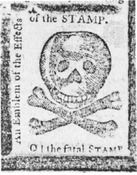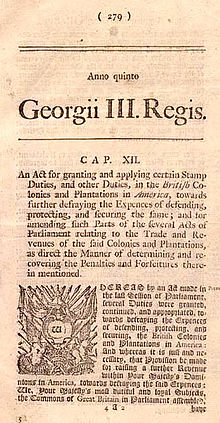
Weekly Standard - The Scapbook
November 16, 2015, Vol. 21, No. 10
Two hundred and fifty years ago, the French and Indian War had just ended, and Britain’s Parliament was determined to find some way to maintain a standing army, to avoid putting 1,500 socially well-connected officers out of work. Their solution was to keep the Army in North America stationed as a buffer between the colonists and American Indians. Even though, said the colonists, no such buffer was needed.
The Army, of course, had to be paid for, and Parliament decided that the newly buffered colonists should do the paying. First came a sugar tax, which triggered a debate about the rights of Englishmen living in America: The fundamental law of Britain frowned on subjects being taxed without their consent, which was given by sending representatives to Parliament. A cry of “No Taxation Without Representation” was heard, which grew much louder a year later when word reached the colonies that a much more onerous stamp tax—a tax on all printed documents—would soon be enacted.
American colonists sent petitioners to London to seek redress of their grievances. They were ignored. The chancellor of the exchequer, Charles Townshend, addressed the effrontery of the Americans on the floor of the House of Commons: “Will these Americans, children planted by our care, nourished up by our indulgence, till they are grown to a degree of strength and opulence, and protected by our arms, will they grudge to contribute their mite?”
Isaac Barre, a Huguenot Irishman who had served with distinction during the French and Indian War, rose to the Americans’ defense:
“They planted by your care? No! Your oppressions planted them in America. They fled from your tyranny to a then uncultivated and inhospitable country, where they exposed themselves to almost all the hardships to which human nature is liable; and among others, to the cruelties of a savage foe, the most subtle, and I will take upon me to say, the most formidable of any people upon the face of the earth. . . .
“They nourished by your indulgence? They grew by your neglect of them. As soon as you began to care about them, that care was exercised in sending persons to rule them, in one department and another, who were perhaps the deputies of deputies to some member of this House, sent to spy out their liberties, to misrepresent their actions and to prey upon them; men whose behavior on many occasions has caused the blood of those sons of liberty to recoil within them. . . .

“The people, I believe, are as truly loyal as any subjects the king has; but a people jealous of their liberties and who will vindicate them if ever they should be violated.”
Barre’s warnings were ignored. The House of Commons passed the Stamp Act 205 to 49; it was implemented in America 250 years ago this week. Resistance to it was rapidly organized by a new, freedom-minded group which took its name from Barre’s speech: the Sons of Liberty.
The Scrapbook wishes a happy 250th birthday to the start of the American Revolution.

 RSS Feed
RSS Feed
